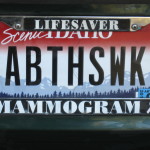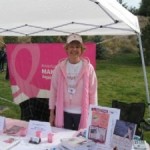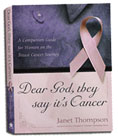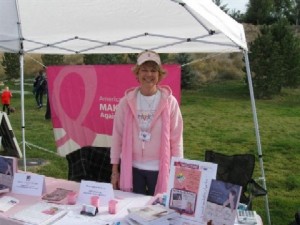In loving memory of my “Grace Abounds”
October ushers in fall with thoughts of pumpkin pie and harvest colors, but for many women like myself, it’s also a reminder that October is National Breast Cancer Awareness Month. I was first diagnosed with breast cancer in October 2002, with recurrences in 2008 and 2011. So for me, and my breast cancer sisters, we’re also thinking pink. BTW pink and brown are great color combinations.
I found purpose in the pain of my first diagnosis by writing the book I wished I had going through my own journey, Dear God, They Say It’s Cancer: A Companion Guide for Women on the Breast Cancer Journey. The hardest chapter to write was “It Could Come Back.” But come back it did come, twice! Any fears I had that my friends and family couldn’t, or wouldn’t, go through this ordeal with me again, were unfounded as they rallied around me each time with love, caring, support and most importantly, prayer.
In the following post, I have suggestions for how you can do the same for the breast cancer friend or family member or neighbor, or fellow employee, or acquaintance you barely know. Because with 1 in 8 women being diagnosed with breast cancer . . . you know a woman who has cried out in anguish, “Dear God, They Say It’s Cancer!”
_____________
“I’m sorry…but you do have breast cancer.”
Those shocking words crackling through my cell phone rocked my world eleven years ago. I was running errands…trying to outrun suspected bad news. After the doctor’s parting words, “You’ll be fine,” I fired up the car engine and started driving and dialing. The first person I called, after I told my husband, was my best friend, but she couldn’t comprehend the diagnosis. “A positive biopsy doesn’t mean it’s malignant, does it?” she asked.
It’s hard to know what to say or do when a friend or relative drops the bombshell news that she has breast cancer. Often our natural response is to recoil and retreat. Maybe it’s the fear of facing our own mortality or the time and emotion required if we do get involved. We ease our conscience by thinking: she would rather be alone right now anyway. Or she needs her family at a time like this. Or she has so many friends; I know someone will help her.
We may send a card or make a call offering to help, closing with “I’ll be praying for you,” then on we go about our life while her life crumbles. Yet the Bible clearly tells us to, “Help each other in troubles and problems. This is the kind of law Christ asks us to obey” (Galatians 6:2 NLV).
How can we put that verse into practical terms? What does it truly mean to help each other in troubles and problems? Perhaps you can glean some ideas from the ways my friends and family came along side me during my initial breast cancer journey and two recurrences.
Helping Her with the Bad Days
Don’t Just Offer to Help—Do Something Tangible
Most of us find it difficult to receive help; we are hesitant to impose on others. When asked the generic question, “How can I help you?” our common response is, “I’m fine, but thank you for asking.” Truthfully, we need everything, but we don’t know if the person is offering to mop our floors or pick up our kids from school—both of which we need, but are afraid to ask.
Another well-meaning comment I received was, “Just call me if you need anything.” Now how many women are going to pick up the phone and ask for help, especially if they are not feeling well? Again, we don’t know what the person is willing to do for us, and we don’t want to be a burden.
So instead of offering to help—just jump in and do something. If you know your friend well, you know where she needs help; and even if you don’t know her well, you know where all women need help. If she is in the midst of cancer treatment, she is going to need assistance with every area of her life, especially if she is single. Here are some practical ideas:
- Schedule her friends, family, and church to bring meals. Use your lunch break to take her lunch and eat with her.
- Offer to drive her to doctor’s appointments or treatments and take notes for her.
- Shuttle her kids to and from school or find someone who can.
- Sit with her during chemo treatments or accompany her to radiation. Talk, read a book to her, or just hold her hand.
- Take her children on a play date or to your house.
- Do her laundry.
- Do her grocery shopping. If she is too sick to dictate a list, take an inventory of her refrigerator and cupboards and make your own list.
- Answer her email.
- Bring her a gift that makes her feel feminine.
- If she feels like talking, sit and chat with her. When she doesn’t feel like talking, just be a presence in her home so she doesn’t feel alone.
- Babysit her kids so she and her husband can have some private time.
- Clean her house or pay someone to do it.
- Go with her to pick out a wig or prosthesis.
- Pick up prescriptions.
- Run errands.
My first surgery and treatment extended over the Christmas holidays, and we had six grandchildren at that time. I had bought their presents already but couldn’t imagine wrapping them. So my friend took all the presents home and wrapped them, as well as organizing other friends to deliver meals for three months. During my recuperation, she sat on my bed with my laptop, read my emails to me, and then sent my dictated answers. Later, she accompanied me to radiation, fixed my hair when I had a frozen shoulder, and stuck beside me through the entire cancer ordeal, even though she admits that her first reaction to my phone call on that dreaded diagnosis day was, “Lord, I don’t want to do this.” God assured her that she could do it, and she did.
Don’t Say, “I’ll Pray For You,” Unless You Mean It
At church a couple came up to greet my husband and me and asked if they could pray for us. That meant so much to me as we wrapped our arms around each other, and there on the church patio, this precious couple prayed for my recovery and Dave’s strength for the journey. When we finished, the wife asked where we needed help. I hesitated because I knew this woman didn’t like to cook, but Dave quickly interjected, “We could use a meal.” She didn’t flinch. She said they would be over the next night with dinner, and they were…and they prayed for us again.
“I’ll pray for you” is said too often with the casualness of “Have a nice day.” But a promise to pray isn’t just a feel good phrase. We are telling someone that we will petition God on her behalf, and we are living falsely if we don’t. I find it’s best to stop in the moment and pray right then. It keeps me honest and blesses the other person.
Helping Her Enjoy the Good Days
Be Happy with Her When She’s Happy
Cancer is a grim word. Overnight life becomes serious, tense, and laden with fear. There is very little laughter during those first shocking days following the “dreaded diagnosis.” But life continues and there are going to be good days interspersed with the bad. An insightful friend will capitalize on the moments of reprieve when there is an opportunity to laugh or smile. Be ready, because it may only last a moment, but the break from pain and fear is immeasurable.
If your friend is having an especially good day, avoid topics that you know will bring her down. You aren’t minimizing or making light of the seriousness of the situation, but you are giving her a recess from the intensity. Don’t fake happiness, but take advantage of humorous or lighter moments. Smile. Laugh. Be happy. Don’t let the serious eclipse the humorous.
I remember laughing at myself one day in the shower when I realized that I was so carefully not shaving under my left arm because of the lymph node surgery, that I also wasn’t shaving my left leg. I frequently retold that story so people could laugh with me.
Nurture the Little Girl Inside Her
When I was in the hospital, the nurse in charge of the breast-care unit gave me a white stuffed toy sheep named “Fleece.” Taking Fleece with me everywhere, I held him as a shield in front of my sore breast, tucked him under my arm as an armrest, and snuggled next to him in bed. For six months, I indulged my childish need for security and no one chastised me for it. In fact, they acted like it was normal. And I discovered when I was writing my book, Dear God, They Say It’s Cancer, that it was normal! One woman who shared her story in the book had a black stuffed sheep named “Lamby” that she cuddled in her hospital bed. Another received a baby-sized pillow, and she recalls, “That pillow became a part of my wardrobe for eighteen months.”
Comfort and Security Gifts
- A stuffed animal, pillow, or quilt.
- A favorite food.
- A game she loves to play and play it with her.
- A movie she loved as a kid and watch it with her.
- A surprise reunion with childhood friends.
- A tea party.
- A fun hat—even if she hasn’t lost her hair, she might not feel like fixing her hair.
- A new nightgown that buttons down the front.
- An ice cream cone.
- A nightlight.
Shower Her with Love
Kay Warren shared with me about her breast cancer experience, “I don’t know how we would have gotten through this difficult time without the outpouring of love and support from so many. I have not felt alone at all…which is such an amazing gift!” And that it is…love is the best gift you can give to your friend suffering with breast cancer. Don’t desert her when she needs you most. Right now, she requires extravagant love, and God will help you when your heart is breaking or it just seems too sad or too hard. John 13:34 tells us to love one another just as God has loved us. God is the author of love and He knows just what your friend needs, and He will show you how to love her when she is feeling unlovable.
Surprise her. What woman doesn’t love an unexpected gift or demonstration of how valuable she is to us? We were in the midst of a messy kitchen remodel when breast cancer assaulted me. Everything in my life seemed out of control. But I felt so loved the day I returned home after the painful needle biopsy and spotted amongst the rubble—gift bags full of treats with balloons attached and a card from two girlfriends assuring me they had been praying during the ordeal.
Ideas For Showering Your Breast Cancer Friend With Love
- A Spa day at a salon, which treats women with breast cancer.
- If she wears a hat or scarf, wear one too.
- Tell her how much you love her and what a great friend she is.
- Stick with her even when the treatment lingers on. Her biggest fear is that others will not endure the journey.
- Include her in as many activities as she feels up to.
- Go to a breast-cancer support group with her.
- Plan a girls’ day or night out, when she feels up to it.
- Sit and watch old movies with her—even if she falls asleep.
- Do her makeup.
- Pray for and with her.
The Bible assures us in Proverbs 17:17 that “A friend loves at all times.” What a privilege it is to put that verse into practice for your precious friend with breast cancer. You probably won’t be able to do everything I suggest and I hope you have ideas of your own, but as a three-time breast cancer survivor, I assure you there are three things that will endure through the good and the bad times—faith, hope, and love—and the greatest of these is love.
The Top Thirteen Things to Do or Say and NOT to Do or Say to Someone with Breast Cancer
Article includes excerpts from Dear God, They Say It’s Cancer: A Companion Guide for Women on the Breast Cancer Journey.
In honor of National Breast Cancer Awareness Month, we have further reduced the price of Dear God, They Say It’s Cancer at our website shop for the month of October. I will sign and personalize each book.

















